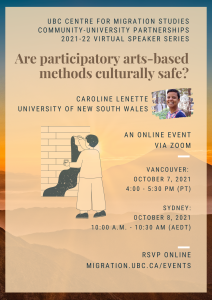“Are participatory arts-based methods culturally safe?” with Dr. Caroline Lenette
Thursday, October 7, 20214:00 PM – 5:30 PM Pacific Time (PT)Friday, October 8, 202110:00 AM – 11:30 Australian Eastern Daylight Time (AEDT)Location: Online via ZoomFree & open to the public. To register, fill out the RSVP form below.
Co-sponsored by the UBC Centre for Migration Studies Community-University Partnerships Group


[Abstract]
The interest in using participatory arts-based methods across a range of disciplines has grown over the past few years. Concurrently, there is a tendency to assume that participatory and creative approaches are inherently ethical. As a result, few researchers actively question their positionality and reflect on the values underpinning their approach. What tends to happen is that participatory methodologies are applied uncritically and might result in culturally unsafe research. This situation can limit the very intent of participatory creative research: to be emancipatory, redress the power imbalances that characterize research initiatives, and yield meaningful outcomes for co-researchers.
To decolonize research methods and the academy, we must do better to ensure that reflexivity is a crucial element of participatory arts-based research. This presentation is based on my experiences in refugee studies and the lessons I have learnt from my use of participatory arts-based methods. I will share my reflections about cultural safety in research, and how we can disrupt colonialist-infused research approaches. These broader questions are relevant to migration studies irrespective of methodology.
[Bio]
Associate Professor Caroline Lenette teaches qualitative research methods and policy analysis courses in the School of Social Sciences at the University of New South Wales, Sydney, Australia. She is an internationally renowned scholar on participatory research and the ethics of co-design and co-production. Caroline has over 16 years’ experience collaborating with refugee-background co-researchers on topics such as mental health and wellbeing, gender equity issues, human rights, and access to higher education, and how to influence policymaking via knowledge translation plans. She has written two sole-authored books on participatory methodologies, published 8 book chapters and 55 peer-reviewed articles in well-read and high impact journals across disciplines on topics such as qualitative research, health, social work, refugee issues, and education.
